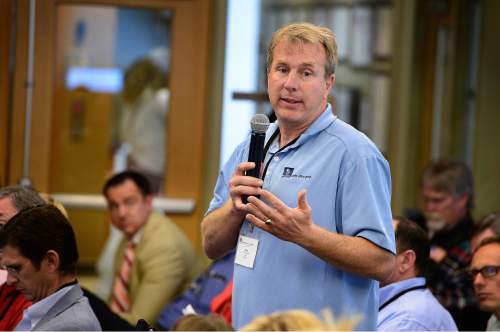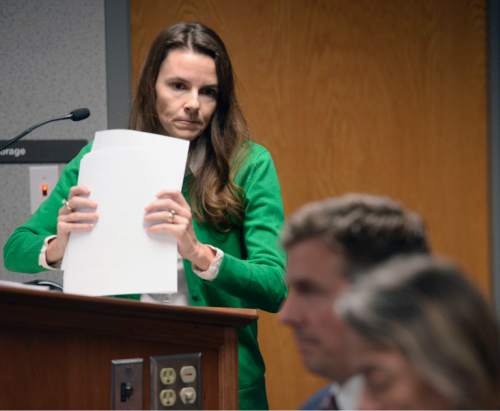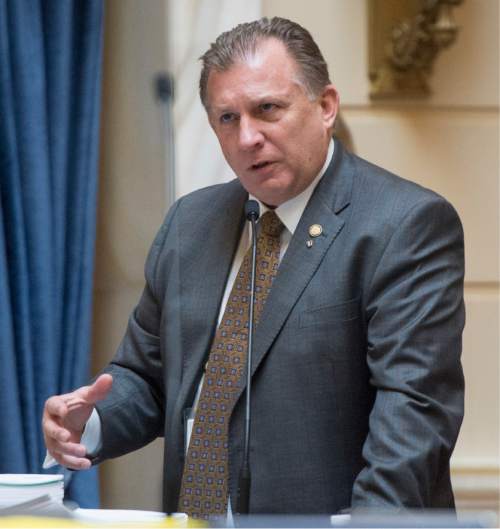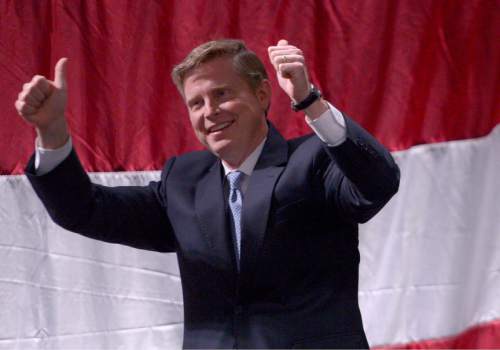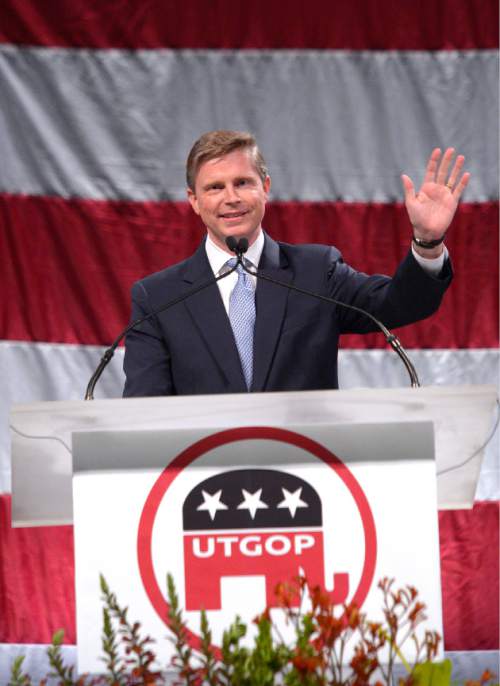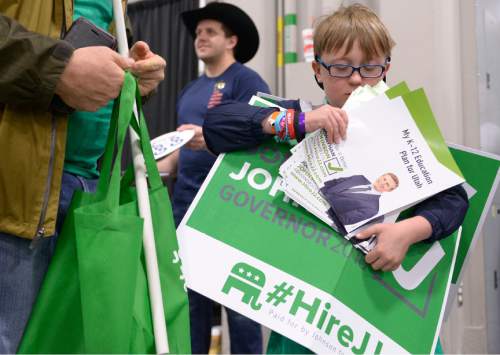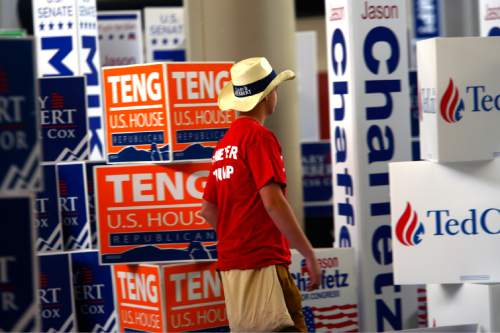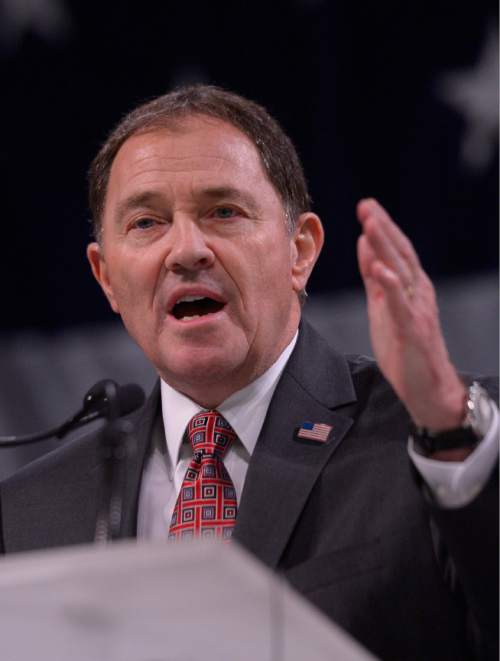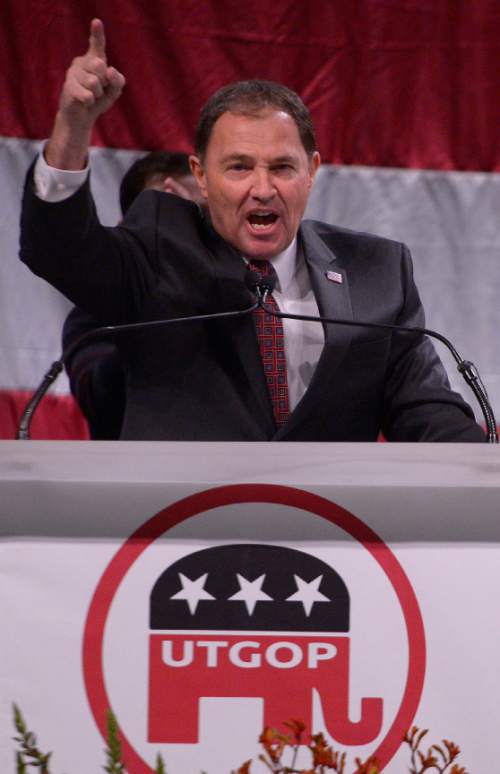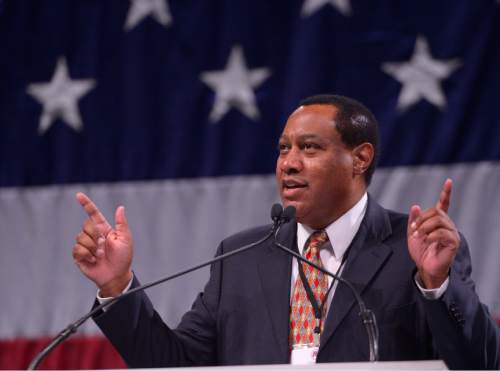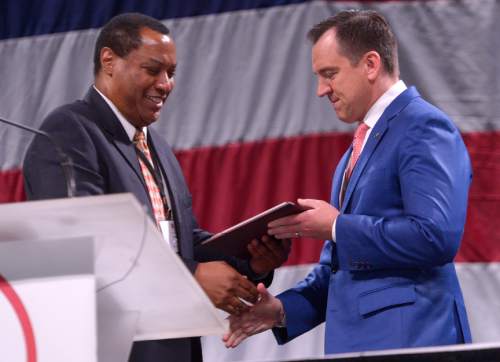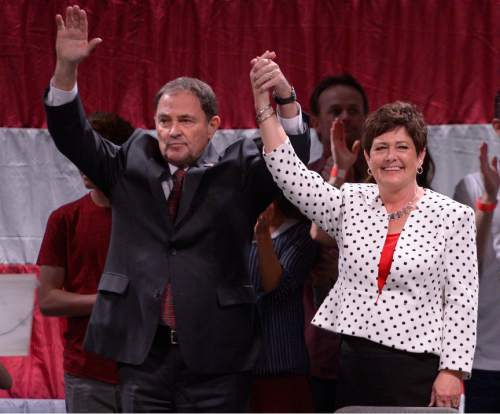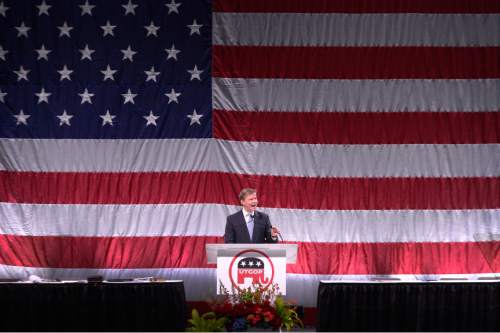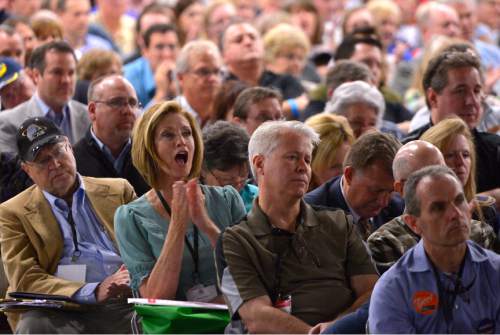This is an archived article that was published on sltrib.com in 2016, and information in the article may be outdated. It is provided only for personal research purposes and may not be reprinted.
Despite enjoying one of the highest approval ratings of any governor in the country, Utah's Gov. Gary Herbert was forced into a primary election Saturday by Overstock.com Chairman Jonathan Johnson, who hammered Herbert over tax hikes, not standing up to federal government intrusion and selling out the party's convention system.
Herbert downplayed the convention defeat, saying that the good news of the day was that he made it through the convention and into the June 28 primary — although Herbert already had been assured a place in that runoff election, having gathered the 28,000 signatures to secure the spot, a tactic that Johnson criticized.
"We're excited about taking this to the next level," Herbert said after the voting. "Rather than 4,000 delegates, we'll take it out to the broader family of 600,000 Republican voters."
The governor said he didn't have regrets about the decision to gather signatures, which he said he did to cover his bases and make sure he would be on the ballot.
Herbert could have knocked Johnson out of the race if he'd received 60 percent of the delegate support and Herbert supporters were hoping to come out somewhere above 50 percent. Instead, it was Johnson who emerged on top, besting Herbert 55-45 percent among the 4,000 delegates.
"When we started, nobody gave me a chance," Johnson said. "The delegates are tired of the status quo, they certainly don't like Common Core [education standards], they don't like tax increases. I think the differences between Gary Herbert and me … are what resonated with [delegates]."
Herbert's campaign handed out cowboy hats and metal sheriff badges that said "Fighting the Feds," ahead of the showdown, as Herbert sought to win his third nomination to the office he inherited in 2009 when Gov. Jon Huntsman accepted the position of U.S. ambassador to China.
Herbert gave a fiery speech in which he tried to blunt some of the criticism that Johnson and another candidate, Nate Jensen, had leveled at him that the incumbent said "may contain a kernel of truth" but distorted and misrepresented the facts.
"This slash-and-burn approach to politics is exactly what's wrong with the country today," Herbert said.
The governor most directly addressed accusations from Johnson's camp that Herbert had turned over control of Utah schools to the federal Common Core education standards.
"Leaders listen and leaders recognize when there is still more work to be done," Herbert said. "Delegates, I am listening."
Herbert vowed to bring parties together and make sure that parents and local educators control Utah education policy.
But Johnson accused Herbert of changing his tune on Common Core and other issues.
"Despite what he says now, Governor Herbert championed Common Core," Johnson said to a chorus of cheers.
"If you want to put an end to Common Core, I'm your person. If you want to say no to more tax increases, I'm your person. If you want us to fight to get the [federal] lands transferred to the state, I'm your person," Johnson said.
Johnson was especially critical of Herbert for gathering the signatures under Utah's new election law, SBill54, to get a spot on the primary ballot.
"I didn't pay someone over $100,000 to gather signatures to circumvent this convention," Johnson said, adding that he instead met with Republican rank-and-file for a year and was "inspired by your stories and concerns."
Herbert acknowledged that signing SB54 may have angered the delegates and hurt him in the convention.
"I've been sued by my own party multiple times, I don't know if that's ever happened in history," Herbert said later. "The delegates are a little more protective [of the convention process]. They don't particularly like this inclusive approach out there."
It is not the first time that delegates have forced a popular incumbent to a primary or rejected the governor entirely.
In 2000, then-Gov. Mike Leavitt was forced to a primary before winning his third term; delegates ended Gov. Olene Walker's political career by ousting her at the party's convention in 2004; and in 2012, delegates made Sen. Orrin Hatch go to a primary with state Sen. Dan Liljenquist on his way to winning a seventh term.
In the 1st Congressional District House race, Rep. Rob Bishop eliminated David Yu-Lin Chu by an 81-18 percent margin and proceeds directly to the general election. Bishop said he wants to serve four more years as chairman of the Natural Resources Committee, as limited by House rules, then retire.
He vowed to fight there for public lands and water. As chairman of that committee, "Now I have the greatest amount of political capital to spend on behalf of Utah."
In the 3rd Congressional District race, Rep. Jason Chaffetz beat Chia-Chi Teng by 64-36 percent, but Teng gathered the signatures needed to land on the primary ballot. Chaffetz criticized Teng, a Brigham Young University professor of information technology whose family fled communist China, for signature-gathering.
"Don't have the opponent come here and tell us he respects the system. He spent more than $100,000 to gather signatures. He went into debt immediately when he started his campaign," Chaffetz said.
In the only statewide race Saturday besides the gubernatorial contest, state Treasurer David Damschen defeated Merrill Cook by an 84-16 percent margin to avoid a primary.
This was the 14th time that Cook has run for office since 1984, and it was the ninth separate office he sought as either a Republican or an independent. In all those attempts, he won two terms as a GOP member of Congress from 1997 to 2001.
Delegates also were voting to elect 37 delegates to the Republican National Convention in Cleveland in July — a potentially important vote if Republican front-runner Donald Trump is unable to lock up the 1,237 delegate votes needed to secure the nomination before the convention.
Various slates of candidates were distributed in the convention hall, including an official slate of candidates endorsed by Ted Cruz, who won Utah's caucus in March by a large margin, and other slates of candidates intent on stopping Trump.
Sen. Orrin Hatch said the November presidential election will be crucial for the country, and couched it as a choice between Democrat Hillary Clinton "and someone not under investigation by the FBI." Hatch said he would work to rally the party around whatever Republican presidential nominee emerges from the convention.
Republican National Committeewoman Enid Mickelsen, who serves on the committee that is organizing the convention, said that if there is violence in Cleveland, "It won't be because of Republicans … it will be from outside agitators" who want to hurt the Republican image.
Candidates running for various legislative districts also had to deal with some of the repercussions of delegate anger over SB54 and the new signature-gathering law.
Utah Republican Party Chairman James Evans said the GOP is a private organization and should get to decide how it picks its nominees.
Evans said the fight over SB54 has put enormous strain on the party "because [some] have insisted that we bend to their will. I can tell you, as long as I'm chairman of the Utah Republican Party, that will never happen."
Sen. Curt Bramble, the architect of the SB54 compromise, was forced to a primary with former state Rep. Chris Herrod — his first primary since he was first elected in 2000 — largely because of his role in fashioning the signature option.
Bramble contended that, had he not sponsored SB54, the group of well-connected and well-funded politicos who organized Count My Vote would have succeeded in passing a ballot initiative that would have done away with the caucus-convention system and replaced it with direct primaries.
"Without that bill we ran, we wouldn't be having this caucus today, we wouldn't be having this contest. It would be an open primary," said Bramble, who added that he was not trying to undermine the convention system. "Nothing could be further from the truth. We saw the imminent demise of the caucus system."
Herrod argued that the caucus-convention system is "the essence of what makes America great, and this principle of the caucus is one of the founding principles, it's a way for elected leaders to stay connected."
Sen. Todd Weiler, R-Woods Cross, eliminated his challenger, Heather Gardner, by a 61-39 percent margin in Senate District 23 — but some shenanigans marred the victory.
In the first attempt at voting, more votes were cast than the number of delegates registered.
Weiler had one more vote than he needed to eliminate Gardner and capture the nomination, but because there were two more votes cast than there should have been, the result was discarded. For more than an hour, officials double-checked delegate credentials, then held another vote.
Gardner, a retired teacher, had criticized Weiler for choosing also to gather signatures to qualify for the primary convention, and for being an outspoken critic of the Republican Party as he defended the SB54 compromise.
"I don't think that hurt me," Weiler said. "There were some people who were upset by it, but that same group would have found some other reason to vote against me."
In House District 68, former Rep. Christine Watkins — who was a Democrat when she served previously — defeated former Rep. Jerry Anderson by an 87-13 percent margin. She will now face Rep. Brad King, D-Price, in the only district held by a Democrat outside of Salt Lake County.
It was a bit of revenge for Watkins, who was defeated by Anderson four years ago as she switched to become a Republican. Two years ago, both were defeated by car dealer Bill Labrum, who was beaten by King.
Former Duchesne County GOP chairman Thomas Winterton told delegates that Watkins was effective when she served as a Democrat, and, "She was a Republican, but just didn't know it."
In other races, Rep. Jake Anderegg won the Republican nomination to replace retiring Sen. Mark Madsen in their northern Utah County Senate district.
Kelly Miles won the nomination in House District 11 over Weber County Commissioner Matt Bell. Rep. Lee Perry, R-Perry, won renomination in House District 29. And Carl Albrecht won the nomination in House District 70.
The convention also passed by a voice vote a resolution that, according to its author, essentially seeks a revolt against "overzealous, overreaching" federal rule.
It could help lead to county clerks refusing marriage licenses to same-sex couples, rejecting federal education guidelines and to the state seizing federal lands, said its author, Lowell Nelson, former vice chairman of the state Republican Party and a current member of its central committee.
The resolution "encourages public officials at all levels of government to nullify any federal order, act, opinion, or regulation that lies outside the bounds of lawful authority of the federal government." Nelson said that does not just mean suing.
"Instead, the state should simply take control of the land in the case of public lands. And we should refuse to implement the edicts of the Department of Education if we disagree with them. And we should simply refuse to issue same-sex marriage licenses — if we in fact want to uphold the Utah Constitution," Nelson said in an earlier interview. —
Republicans at a glance
Results of contested GOP races (60 percent needed to win party nomination and avoid primary)
Governor • Jonathan Johnson, 55%, Gov. Gary Herbert, 45%.
U.S. House Dist. 1 • Rep. Rob Bishop, 82%; David Yu-Lin Chu, 18%.
U.S. House Dist. 3 • Rep. Jason Chaffetz, 64%, Chia-Chi Teng, 36% (but still will appear on primary ballot, qualified by gathering signatures).
See Page A13 for state nominee races


